Can it get complicated? Yes, it can!
Condominiums differ from single-family homes in that the owners don’t own the entire building or the land, and owners share common areas, like pools and rec rooms as well. So, not surprisingly, condo insurance in Washington state differs, too.
Condos are covered by two separate insurance policies:
- A master policy obtained by the condominium association that insures the building, the land and shared amenities, such as gardens and parking lots;
- A policy obtained by you, the owner, that insures the interior of your condo and personal property.
Unfortunately, there are a lot of grey areas with condo insurance coverage.
Master policies vary a lot in what they will and won’t cover when individual units are damaged. There are also scenarios where you and all the other owners in the complex might face significant out-of-pocket expenses for damage and accidents in common areas. You might think that you’re covered by a master policy but you’re not.
The good news is that condo insurance is widely available, and your insurance agent can help you get the right coverage. If you obtain your condo insurance through AAA Washington, you can choose between a range of insurance companies and policies. Given the complexity of condo insurance in Washington state, it’s worth going over the essentials so that you’re not left underinsured.

What does condo insurance cover?
Condo insurance for individual units is often called an HO-6 policy. This policy covers the areas that you are responsible for — in other words, what isn’t covered by the condo association’s master policy.
Standard condo insurance for individual units in Washington provides two general types of coverage:
- Personal liability: This will cover you if someone gets injured inside your condo, or if that person’s property is damaged. This can include paying medical expenses to the injured party, to pay legal settlements or the investigative and legal costs of defending a lawsuit, etc.
- Property damage: This will cover items located within the condo. It can cover the replacement costs of personal items, like furniture, clothing and electronics. In some cases, the policy will also cover damage to replace fixtures, floors, finish walls and restore the condo to its previous condition.
Here are some scenarios where your individual policy would likely pay the claim:
- A fire damages your furniture and personal possessions;
- Someone slips inside your condo, and you are found liable for the cost of their medical expenses;
- A thief breaks into your unit and steals jewelry and your prized baseball card collection.
What is a master policy?
A master policy, often called an HOA Master Policy, covers the exterior structures of the building where your unit is located, and shared areas. This covers damage to these areas and provides liability coverage if a person is injured in a common area.
Condo owners typically pay for this policy as a percentage of their association dues, but the policy itself is usually obtained and managed by the condominium association.
Here are some scenarios where the master policy will pay a claim:
- A windstorm blows the roof off the building where your unit is located;
- A person is injured at the pool and the complex is found liable for medical expenses;
- Someone breaks into the recreation room and steals expensive exercise equipment;
- The fence around the property is spray-painted with graffiti.

Do master policies differ much?
Yes, master policies can vary tremendously in how they treat damage to individual units. This can dramatically affect the coverage you need to buy for your unit.
Master policies will treat damage to individual units in two general ways:
- A “shell” policy only provides a small amount of coverage for each unit. As the name implies, it leaves the unit as an empty shell after the claim is paid. The unit owner is responsible for finishing the walls, the floors, adding fixtures and appliances, etc. You may even have to replace the wiring and plumbing.
- A “walls-in” policy restores your condo to a pre-sale condition. The policy will replace the flooring, wall finishes, fixtures and oftentimes appliances will be totally replaced.
TIP: It’s important to get a copy of the master policy so that your insurance agent knows what kind of condo coverage you need. You don’t want to buy too much or too little coverage for your unit.
Do I have additional out-of-pocket risks?
Unfortunately, yes. There are cases where the individual condo owners might have to pay out-of-pocket expenses for problems that arise in the complex away from their units. You would expect these claims to be paid by the master policy, but they aren’t covered, or are only partially covered. These fees are often called “loss assessments” or the fee charged for the loss of property held in common. In extreme cases, each condo owner might be on the hook for thousands of dollars.
For example, you might have to pay out of pocket if:
- The master policy doesn’t cover the full cost to repair damage to the building in a fire. Say, the fire does $1 million in damage, but the policy is capped at $700,000. The individual owners could be responsible for the remaining amount.
- There is a serious injury on the property, and the master policy is underinsured for liability coverage.
- The homeowners’ association has failed to obtain specialized insurance, such as earthquake insurance or flooding, and the claim is not covered.
- The master policy has a high deductible, like $25,000 or more.

Can I protect myself from loss assessments?
Yes, you can. All condo owners should consider adding loss assessment coverage to the policy. You can typically buy anywhere from $10,000 to $100,000 depending on the insurer.
Loss assessment insurance can pay:
- Any fee that you have to pay to repair damage to a structure or a common area;
- Your portion of the deductible on a master policy claim;
- Your assessed fee if someone is injured in a common area.
This insurance can be added affordably to a policy and is a relative bargain for the protection it affords.
Other useful insurance
You can also affordably beef up your coverage—and potentially save thousands of dollars if your unit is destroyed in a fire or other natural disaster—with two other useful types of insurance.
Don’t forget to ask your agent about these two important enhancements:
- Enhanced coverage for loss of use: Loss-of-use coverage pays for the costs of renting a home while your condo is being rebuilt or repaired. Normally, your base policy will provide this coverage, but it is often too low, especially if you live in an area with sky-high rental costs, such as Seattle or Bellevue. Plus, keep in mind that repairing a heavily damaged (or destroyed) condo building can take months, and possibly a year or more. So, your out-of-pocket expenses for renting a place can be high.
- Coverage for unit upgrades: A “walls-in” master policy will only cover the original, pre-sale state of your condo, including your original appliances, fixtures and finishes. If you have made significant upgrades to your unit, such as adding stainless steel appliances, granite countertops or hardwood floors, these improvements would not be covered. You’ll need to add this additional coverage to your condo policy to obtain coverage for these improvements.

How much is condo insurance in Washington state?
In Washington state, the average condo insurance cost for an individual unit should be around $500 annually. However, if the master policy doesn’t cover much damage for individual units and you are responsible for restoring the unit to its original condition, the policy will cost more than that. The actual premium will depend on the following factors:
- The coverage limits (the maximum claim that the policy will pay out) can be adjusted. Condo policies tend to have more flexibility than homeowners’ policies in how much coverage you can obtain for the replacement costs of your personal property. The more coverage you buy, the higher the premiums.
- The deductibles (the amount you agree to pay before the insurance starts paying a claim) can usually be adjusted. Lower deductibles increase the premiums.
- Adding additional coverage, such as loss assessment, loss of use and coverage for unit upgrades will increase your base premium.
- The terms of the condo’s master policy will affect the cost of your policy. If the master policy is a “shell” policy, you will need to add more property damage protections to your own policy, which will raise the premium. Conversely, you won’t need as much coverage if your master policy will cover you to rebuild the unit to its original condition, and your premiums will be lower.
As you can see, condo insurance can be tricky. To ensure that your condo and personal property are well protected, it’s a good idea to get hold of your condominium association’s master policy and call your insurance agent. To discuss all your options, call a AAA insurance agent today.
—Written by AAA Washington staff
—Top photo: AdobeStock

